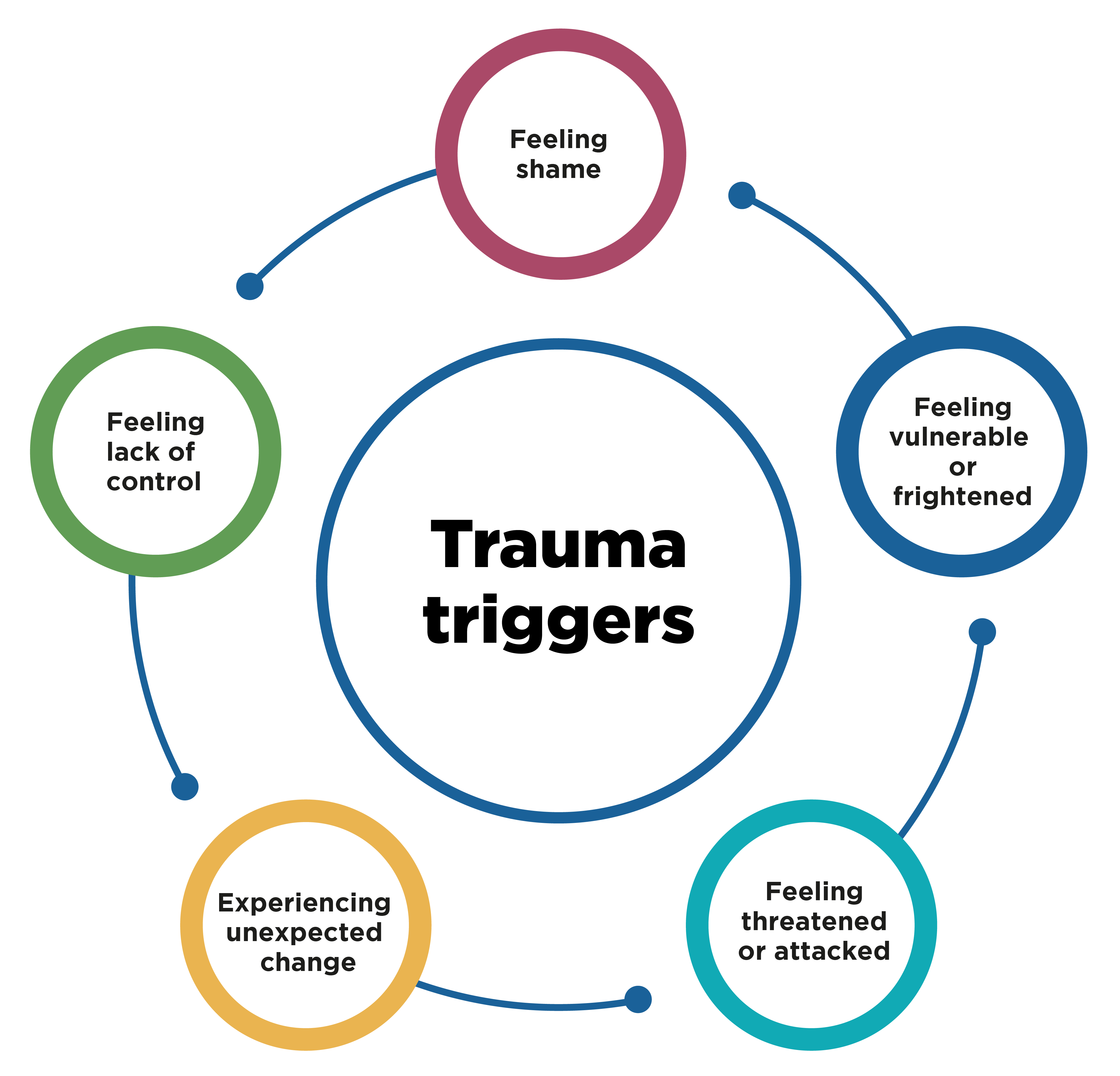Key learnings
- Understand the importance of trauma-informed work.
- Explore recommendations for trauma-informed work.
- Find out how you can develop a trauma-informed training programme.
- Learn how to create a trauma-informed environment for survivors.
The importance of trauma-informed work
Specialised trauma-informed training can help advance survivor financial inclusion by providing support and understanding during the account-opening process and beyond. This will help banks to represent a safe, comfortable and confidential space where employees can engage effectively with survivors and other vulnerable customers who may have experienced trauma.
As part of trauma-informed work, financial institutions should:
- Take time to acknowledge how trauma may affect the emotions and behaviours of survivors, among other vulnerable customers.
- Strive to do no further harm by ensuring that all support is provided in a way that is respectful of the survivor’s need for safety, respect and acceptance. This includes avoiding asking any questions about a survivor’s background or past experience.
Adopting a trauma-informed working environment within financial institutions has further benefits, including:
- Increasing banking staff’s confidence in understanding the needs of survivors and providing appropriate support.
- Promoting inclusivity by ensuring survivor support organisations and survivors feel comfortable and safe when entering a branch.
- Creating a two-way learning platform, raising awareness of modern slavery and survivor needs amongst staff.
- Improving customer care for other vulnerable customers who have been exposed to trauma.
“Nationwide [Building Society] was very helpful. Someone just came to me and they took me to a room. We had a one-to-one in-depth conversation. They were very helpful, so I went there like three times.”
Rebecca, Survivor Consultant
Intersectionality, trauma-informed work and vulnerable individuals
Take care to consider how intersectionality impacts your customers and how you can adapt your policies to support customers (and survivors) of all different gender, race, class, sexual orientation and physical abilities. Review your anti-discriminatory and equality policies to ensure they work to incorporate intersectionality across the board and are explicitly applied when working with survivors.
Lens on, hands on is an intersectional guide to developing a financial capabilities programme created by WIRE. (Access a summarised version here). Key learnings, tools and recommendations can be adopted to reframe employee training programmes. UN Women have also created the Intersectionality Resource Guide and Toolkit, outlining the fundamentals of an intersectional approach and a framework for action to support and empower those facing intersectional discrimination.
Key principles of trauma-informed work
Trauma-informed work is essential when working with survivors to provide meaningful engagement and create a comfortable environment. Below is the list of key principles that can be adopted when implementing a trauma-informed approach.
Spotlight interview: The importance of trauma-informed work
In this spotlight interview, we chat with Rachel Witkin, Director of Counter-Trafficking and Publications at the Helen Bamber Foundation and co-writer of the Trauma-Informed Code of Conduct.
The following recommendations are informed by two key resources: the FAST Trauma Sensitivity Training webinar and the Trauma-Informed Code of Conduct (TiCC). They can be used to introduce trauma-informed care for other employees and complement a practical training programme.
The Trauma-Informed Code of Conduct
Key recommendations from the Trauma-Informed Code of Conduct:
- Ensure that you look after yourself when working with a survivor to avoid secondary traumatisation or professional ‘burnout.’
- Speak slowly and in a friendly manner, in a way that ‘creates the illusion of time.’ This can bring feelings of security, trust and confidence to both the survivor and the employee.
- Adopt a non-judgemental, kind and respectful attitude.
- Make it easy for a survivor to ask questions by providing necessary time, space and professional support.
- Avoid asking any personal questions and ensure that you remain professional when working with survivors. Remember, it is no more appropriate to ask a survivor about their background than it is any other customer who has experienced trauma.
For financial institutions, the relevant chapters are:
- 5. Explaining professionals’ identity, role and duties
- 6. Working with interpreters and cultural mediators
- 10. Providing a calm, consistent and welcoming environment
- 11. Maintaining awareness of communication in all forms
- 12. Setting realistic goals and objectives
- 16. Trauma-informed methods of working for remote phone and video calls
The FAST “Trauma Sensitivity Training” webinar
This webinar, created by the FAST Survivor Inclusion Initiative, gives guidance to financial industry employees on how to work with survivors in a trauma-informed way. Incorporating this webinar as a part of employee training is highly recommended.
Key recommendations from the above webinar include:
- Explain why you are asking certain questions, be transparent and follow through on promises to build trust. Only ask questions that need to be asked and honour the confidentiality of a survivor.
- Set clear boundaries by explaining your role and what you can offer.
- When working remotely, check that a survivor is in a safe place to talk and that their phone is secure before engaging in conversation.
- Allow space for independent decision-making by providing clear information. This includes supporting a survivor who decides they are not ready to open an account and avoiding telling a survivor what they might want or need.
- Use active and reflective listening. Avoid psychoanalysing or diagnosing a survivor, reassuring a survivor or comparing and self-disclosing.
- Pay attention to the verbal and non-verbal cues of both yourself and a survivor. If a survivor appears uncomfortable or nervous, offer a glass of water or allow a few minutes alone.
How to develop a trauma-informed training programme
Creating a trauma-informed training programme for financial industry employees will improve the experience of survivors engaging with the bank. It helps to create an environment of safety and security for survivors and raises awareness of the impact of modern slavery amongst financial professionals.
“Survivor leadership is not ‘charity.’ It is essential.”
Dr. Shobana Powell, DSW, LCSW, CEO & Founder of Shobana Powell Consulting
Involving survivors
Involving survivors within the employee training programme, will empower survivors and ensure that tailored care meets their needs. We highly recommend engaging with survivor leaders in the development of training programmes and offering survivors the chance to lead sessions (either in person or virtually).
To find out more about the impact of survivor-led training, click the button below.
Survivor Alliance is an organisation working to empower survivors to become leaders of the anti-trafficking movement. They hold training days several times a year and provide training that can be tailored to the goals of your organisation. You can find out more in their Allies Training brochure.
There are also numerous survivor leaders, trainers and consultants globally who offer trauma-informed practices, including:
“Now I understand we are more and if we join together, we are going to change the world.”
Survivor Alliance member
“Survivor Banking Champions” and Specialist Support Teams
Identifying and training specific members of staff to become “Survivor Banking Champions” can ensure that survivors and survivor support organisations have a personal point of contact with the bank, who has been trained in a trauma-informed way. Appointing senior members of branch staff to this role and creating a dedicated survivor inclusion email address has shown to create a more successful survivor financial empowerment programme.
Similarly, having an established Specialist Support Team who sit above branch level, have been trained in a trauma-informed manner and understand the specific challenges facing survivors will help to oversee the roll-out of trauma-informed cases and maintain standards despite any employee changeover among “Survivor Banking Champions.”
Externally, it is beneficial for survivors if “survivor” labels are removed. Therefore, although individual branch staff can be internally appointed “Survivor Banking Champions”, it can be helpful to change the program name when working with survivors, to avoid labelling individuals and to help them move forward.
Skills for Care Training Framework
The Skills for Care Training Framework has been created to establish clear training standards, knowledge and skills for those who may meet survivors of modern slavery. This framework is publicly owned and has been designed to be accessible and available to anyone in any industry. Financial institutions can use this framework and access clear learning outcomes to review and guide their own training programmes.
Creating a trauma-informed environment
Providing a trauma-informed environment for survivors within the bank can help survivors to feel as comfortable and confident as possible when working with financial industry employees.
“The best practice that’s been demonstrated by HSBC so far [includes] creating an environment in which survivors can walk into a branch and be given a safe space in which to ask questions about how an account might work. Giving that time to survivors, in-branch, is really life-changing.”
Avril Sharp, Kalayaan
To create a trauma-informed environment, it is important for financial institutions to:
- Allow a survivor space, both mentally and physically, to process their thoughts and make independent decisions.
- Acknowledge that being safe and feeling safe are two separate things.
- Create a light environment that reflects calmness and avoids an interview-style setting. It can also help to keep simple objects nearby, such as a plant or a painting.
- Maintain a calm and steady voice. Try to talk slowly to create the illusion of time and relieve any feeling of being rushed.
- Review and update any policies which could cause a survivor to feel excluded or rejected.
Summary: Important guidance
- Involve survivor leaders to inform, review and present modern slavery and trauma-informed training programmes, raising awareness amongst employees of the challenges faced by survivors.
- Identify and train specific employees to become “Survivor Banking Champions” or create Specialist Support Teams.
- Incorporate trauma-informed training as part of new starter onboarding.
- Consider how intersectionality impacts your customers and how policies can be adapted to support customers and survivors of all different genders, races, classes, sexual orientations and physical abilities.
- Provide a safe space for survivors where they are treated with patience, validation and dignity.








